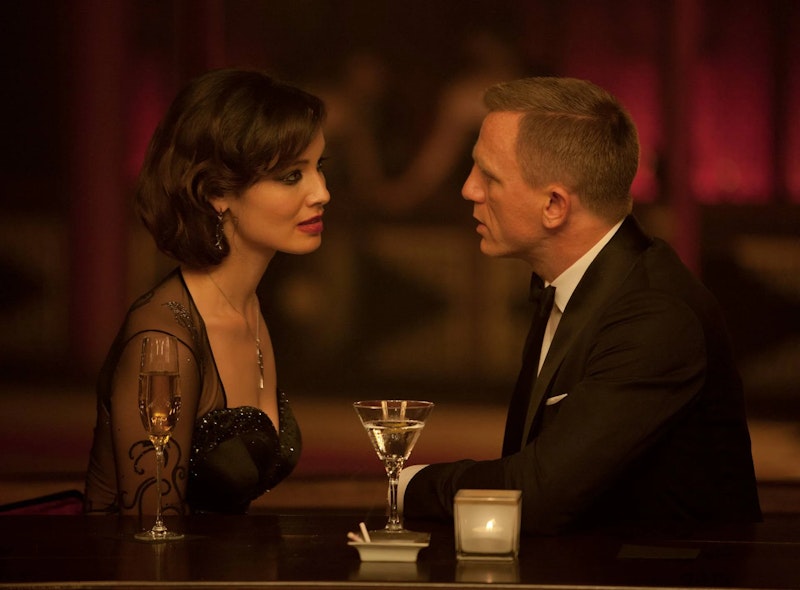2012 marked the 50th anniversary of Eon Productions’ James Bond film franchise, and the company made sure to have a new movie out that year: Skyfall is the 23rd in the series and the third to star Daniel Craig. It became the first Bond film to make over $1 billion at the worldwide box office, and soon after its release became the seventh highest grossing movie ever. Despite this, its overwhelming financial success was overshadowed as 2012 saw another film do even better.
That was the year of Marvel’s first Avengers movie. It’s tempting to now look back at that film and see a shift in public taste away from post-9/11 paranoia to a more sedated and Disneyfied cinema. Skyfall has other models, other aims; it imitates the more depressing superhero movies like Christopher Nolan’s Batman. It has a meta-story to serve, just as The Avengers did, but is committed to a darker tone. The plot is only loosely tied to the last couple of Bond films, but James Bond as a character is put through the same kind of wringer.
The movie opens in Istanbul, with Bond chasing a man who has swiped a hard drive with the identities of undercover MI6 agents. Bond can’t stop him, through no fault of his own, and ends up presumed dead. Later, with M (Judi Dench) under pressure to retire, MI6 headquarters is blown up by the cyberterrorist who ordered the theft of the hard drive and Bond returns to action. Still wobbly, he’s sent after the original thief. After killing the thief in a fight in Shanghai, Bond follows a tenuous trail to Macao and ultimately to a man calling himself Raoul Silva (Javier Bardem).
Silva, the thief’s boss and the bombing mastermind, is a former MI6 agent with a grudge against M, who he feels betrayed his trust and abandoned him in the field. Captured and taken to MI6 headquarters, Silva escapes after the inept handling of his laptop allows a virus to be planted in MI6 servers. Able to forecast events with uncanny precision, Silva’s subsequent assassination attempt on M nevertheless fails. Bond takes M with him to his childhood home, a manor in Scotland, and there they wait for an explosive finale with Silva.
Neal Purvis and Robert Wade are back as writers but this time with the addition of John Logan. Their script has the hallmark of the last few Bond movies: lazy plotting, to some extent mitigated by a close focus on Bond’s character. Here they also give Judi Dench’s M a lot to do and unsurprisingly, Dench handles it brilliantly.
Sam Mendes is the director, Roger Deakins the cinematographer, thus making Skyfall the most consistently beautiful Bond film. It’s painterly in several different ways across different settings: a Shanghai skyscraper filled with shadows and blue light shining in from the outside, the misty gray of rural Scotland, and the underground Victorian architecture of the new MI6 headquarters, alternately too dark and too bright. Skyfall looks lovely almost every second.
Unfortunately, the narrative logic doesn’t hold once Silva enters the picture. He’s held back too long for no purpose, disconnected from the action earlier in the film; but that aside his ability to predict the most unlikely things in precise detail (so long as it fits the plot) is ridiculous. In particular, his plan hinges on the head of MI6’s Q branch not thinking to take the most basic precautions to protect MI6 computer systems from a virus. The movie gives Silva unlikely powers of intelligence, then emphasizes it by making other characters stupid.
At least Craig is good, playing a notably older Bond, one ready to take the excuse of being presumed dead as an opportunity to come in from the cold. There’s something sad, slightly too twisted to be touching, in the way he calls Dench’s M “mum.” As with Silva, she’s his mother figure, twisting the need of an orphan for a parent substitute to turn him into a killer. It’s a good idea, and played well, but again the character development isn’t served by the unconvincing plot.
Although Bardem does some fine work, as a character Silva is far too derivative of Nolan’s Joker in Dark Knight. An interesting choice of character to mimic, but it’s too close and sets up a comparison that Skyfall can’t sustain. One also might note that Bond, an orphan, is now given a backstory in which he grew up in a rich manor. Nolan was trying big ideas using the Joker as an embodiment of chaos. Silva never becomes emblematic of anything beyond himself and his desire for revenge. The lack of conceptual subtext undercuts the attempt at gravitas and we’re left with just another action film.
The movie is about nothing more than Bond-as-film-franchise. It brings back familiar Bond elements for the Craig era: we get new versions of Q (Ben Whishaw, channeling Matt Smith in Doctor Who) and Miss Moneypenny (Naomie Harris), and we see Bond drive an Aston Martin DB5. None of this is bad and it’s welcome to see many of these things again, just as it’s nice to hear a bit of humor missing from Craig’s earlier Bond films. But, as with those movies, you feel that this one has ambitions it can’t fulfill. The line “sometimes the old ways are the best” is repeated, and in other movies that might have some sort of thematic resonance; here it points mainly to nostalgia for earlier Bond films.
It's true that when you hit a 50th anniversary, some nostalgia is fair. And the mix of new and old in this movie is one of its strongest points. But there’s too much here that’s too conceptually weak to work.

